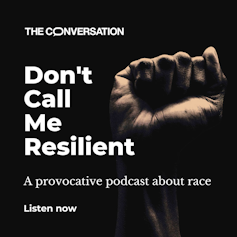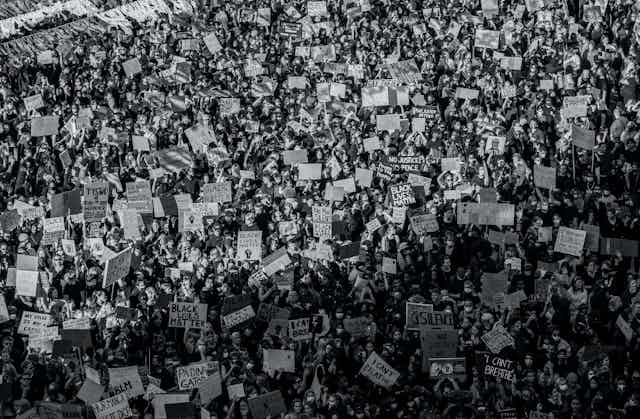Today we launch Season 2 of Don’t Call Me Resilient, our podcast that takes on systemic racism and the ways it permeates so many moments and systems of our everyday lives. The response to our first season of our podcast, which you can catch up on here, was extremely positive.
This season we tackle everything from how we view pollution … to the impact of data collection on marginalized communities … to the crucial role of storytelling in surviving our current world and building a better one.
As we live through what feels like the world falling apart, we’ll focus on imagining a better future together.
Please listen in. Follow us: I hope you find the conversations as inspiring as I do.
You can listen to all of the episodes or follow on Apple Podcasts, Google Podcasts, Spotify or wherever you listen to your favourite podcasts.
We’d love to hear from you, including any ideas for future episodes. Join The Conversation on Twitter, Facebook and Instagram and use #DontCallMeResilient.
Season 2 episodes
EP 7: How stories about alternate worlds can help us imagine a better future:
Stories are a powerful tool to resist oppressive situations. They give writers from marginalized communities a way to imagine alternate realities, and to critique the one we live in. In this episode, Vinita speaks to two storytellers who offer up wonderous “otherworlds” for Indigenous and Black people. Selwyn Seyfu Hinds is an L.A-based screenwriter who wrote for Jordan Peele’s The Twilight Zone and is currently writing the screenplay for Esi Edugyan’s Washington Black. Daniel Heath Justice is professor and Canada Research Chair in Indigenous literature and expressive culture at the University of British Columbia.
EP 8: Stolen identities: What does it mean to be Indigenous?
Over the last few years, we’ve seen a lot of high-profile figures accused of falsely claiming Indigenous identity, of being “Pretendians.” These cases have become big news stories, but they have big real-life consequences, too. Misidentifying as Indigenous can have financial and social consequences, with the misdirection of funds, jobs or grants meant for Indigenous peoples. Vinita delves into it all with two researchers who look at identity and belonging in Indigenous communities: Veldon Coburn from the University of Ottawa and Celeste Pedri-Spade from Queen’s University.
EP 9: Model minority blues: The mental health consequences of being a model citizen
The pandemic has taken a toll on our collective mental health. But according to a recent Statistics Canada report, South Asians reported a steeper decline than any other diaspora in Canada. Why? The idea of being a model minority — of having to live up to exacting high standards — is a big part of it. Two long-time researchers and activists join Vinita for an intimate conversation about that and other reasons why South Asians are struggling so badly, and what can be done about it. Maneet Chahal is co-founder of SOCH, one of the few mental health organizations specifically for South Asians. Satwinder Bains is the director of the South Asian Studies Institute and professor of social cultural media studies at the University of the Fraser Valley.
EP 10: Being Watched: How surveillance amplifies racist policing and threatens the right to protest
Many of us know our personal data is being collected online and used against us – to get us to buy certain things or vote a certain way. But for marginalized communities, the collection of data and photos has much bigger implications. Vinita is joined by two researchers who are calling for new protections for the most vulnerable populations. Yuan Stevens is the Policy Lead in the Technology, Cybersecurity and Democracy Programme at the Ryerson Leadership Lab and Wendy Hui Kyong Chun is professor and Canada 150 Research Chair in new media at Simon Fraser University.
EP 11: Why pollution is as much about colonialism as chemicals
The state of our environment just keeps getting scarier and scarier, yet it feels like we have yet to find a way forward. Two Indigenous scholars who run labs to address the climate crisis say bringing an Indigenous understanding to environmental justice could help us get unstuck. A big part of that is seeing pollution through a new lens – one that acknowledges it is as much about racism and colonialism as it is toxic chemicals. Vinita talks to Michelle Murphy, Professor and Canada Research Chair in science and technology studies and leader at the University of Toronto’s Environmental Data Justice Lab. Also joining is Max Liboiron, author of Pollution is Colonialism, and associate professor in geography at Memorial University of Newfoundland.
One out of every eight households in Canada is food insecure. For racialized Canadians, that number is higher – two to three times the national average. In this episode, Vinita asks what is happening with our food systems, and what we can do to make them fairer with two women who have been tackling this issue for years. Melana Roberts is Chair of Food Secure Canada and one of the leaders behind Canada’s first Black food sovereignty plan. Also joining the conversation is Tabitha Robin Martens, assistant professor at UBC’s Faculty of Land and Food Systems. Martens researches Indigenous food sovereignty and works with Cree communities to bolster traditional land uses.
Catch up and listen to Season 1

Season 1 Trailer: Don’t Call Me Resilient
Don’t Call Me Resilient is a provocative new podcast about race from The Conversation. Host Vinita Srivastava takes you deep into conversations with scholars and activists who view the world, its problems, and the way forward through an anti-racist lens. Instead of calling those who have survived the pain of systemic racism “resilient,” this podcast goes in search of solutions for the things no one should have to be resilient for.
EP 1: What’s in a word? How to confront 150 years of racial stereotypes
We keep hearing stories about white and non-Black people – including academics – somehow thinking it’s ok to use the n-word. Ryerson University Professor Cheryl Thompson, author of ‘Uncle: Race, Nostalgia and the Politics of Loyalty,’ joins us to discuss how North American society spent the last 150 years creating racist stereotypes and language, how they continue to persist today – and what we might do to help stop it.
EP 2: How to deal with the pain of racism – and become a better advocate
A global protest movement calling for an end to racism and police brutality sparked new conversations about race. But it also surfaced a lot of pain for those who deal daily with racism. Where do we go from here? The writer, activist and Zen priest Reverend angel Kyodo williams speaks about the pain of racism, and how she uses meditation to combat it – and become a stronger anti-racist activist in America today.
EP 3: How to spark change within our unequal education system
Even before COVID-19, education experts were sounding the alarm about the future of racialized children in our schools. And the COVID-19 pandemic has only underscored – even deepened – the divide. Carl James, professor of education at York University and Kulsoom Anwer, a high school teacher who works out of one of Toronto’s most marginalized neighborhoods, Jane and Finch, join us to discuss the injustices and inequalities in the education system – and the way forward.
EP 4: How we treat migrant workers who put food on our tables
Documentary filmmaker and OCAD University associate professor Min Sook Lee has been documenting the voices of migrant farm workers in Canada for two decades. What she has to say about how these workers have been treated during COVID-19 shatters any remaining myths about “Canada the Good.” How do we treat the workers that put food on our tables?
When COVID-19 first appeared, some said it was the great equalizer. But the facts quickly revealed a grim reality: COVID-19 disproportionately impacts Black, Indigenous, poor and racialized communities. Roberta K. Timothy, assistant professor at the Dalla Lana School of Public Health at the University of Toronto, joins us to talk about her global research project, Black Health Matters, and why racial justice is a public health matter.
EP 6: Indigenous land defenders
Two Indigenous land defenders join us to explain why they work to protect land against invasive development and why their work is necessary for everyone’s survival. Ellen Gabriel, a human rights activist and artist well known for her role as a spokesperson during the 1990 Oka crisis, and Anne Spice, a professor at Ryerson University, discuss the importance and urgency of defending land.
Credits
Don’t Call Me Resilient is a production of The Conversation Canada. This podcast was produced with a grant for Journalism Innovation from the Social Sciences and Humanities Research Council of Canada. The series is produced and hosted by Vinita Srivastava. Our producer is Susana Ferreira. Our associate producer is Ibrahim Daair. Reza Dahya is our sound producer. Our consulting producer is Jennifer Moroz. Lisa Varano is our audience development editor and Scott White is the CEO of The Conversation Canada. Zaki Ibrahim wrote and performed the music we use on the pod. The track is called Something in the Water. For episode 8, Haley Lewis co-produced. For episode 9, Vaishnavi Dandekar was our editorial intern.

